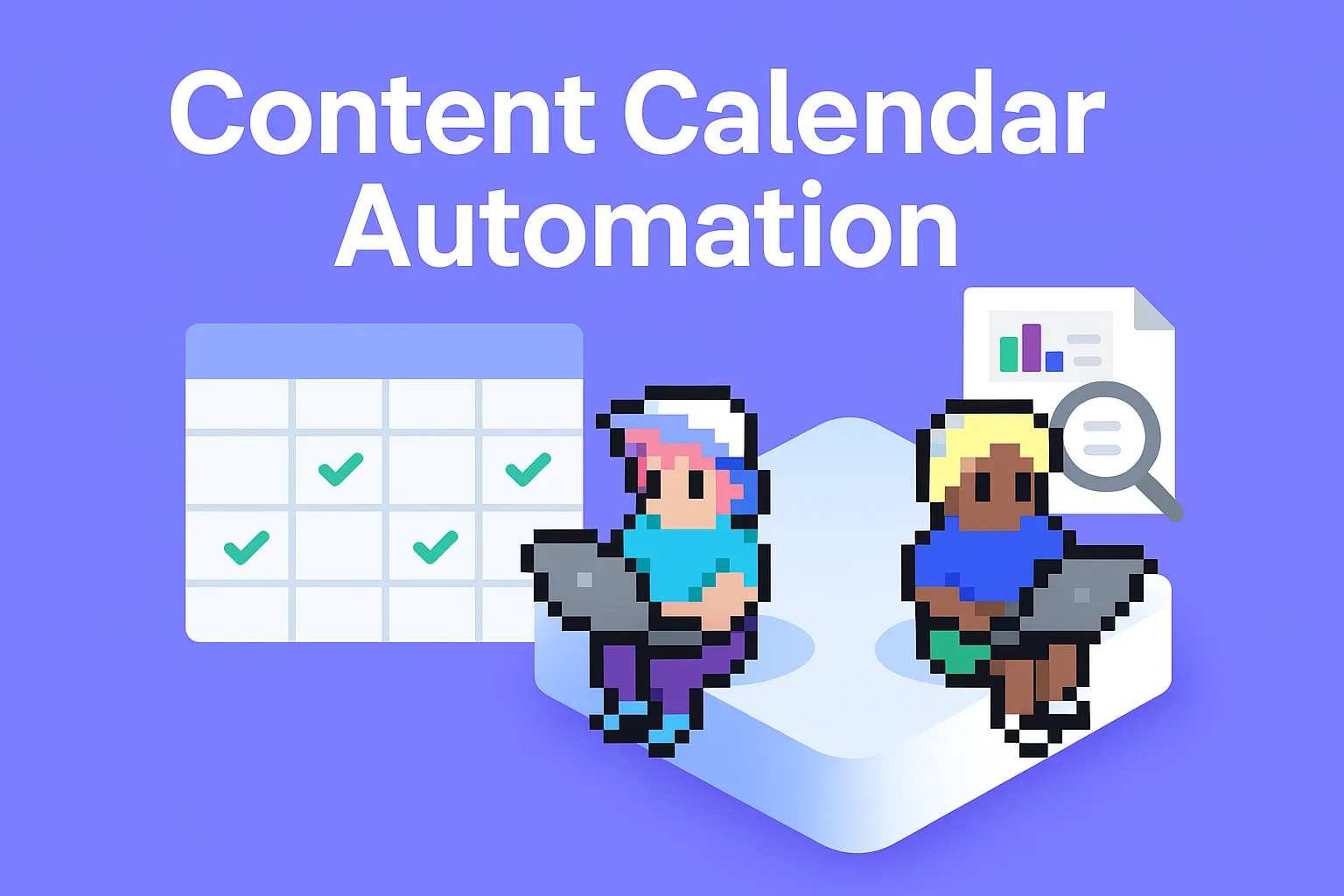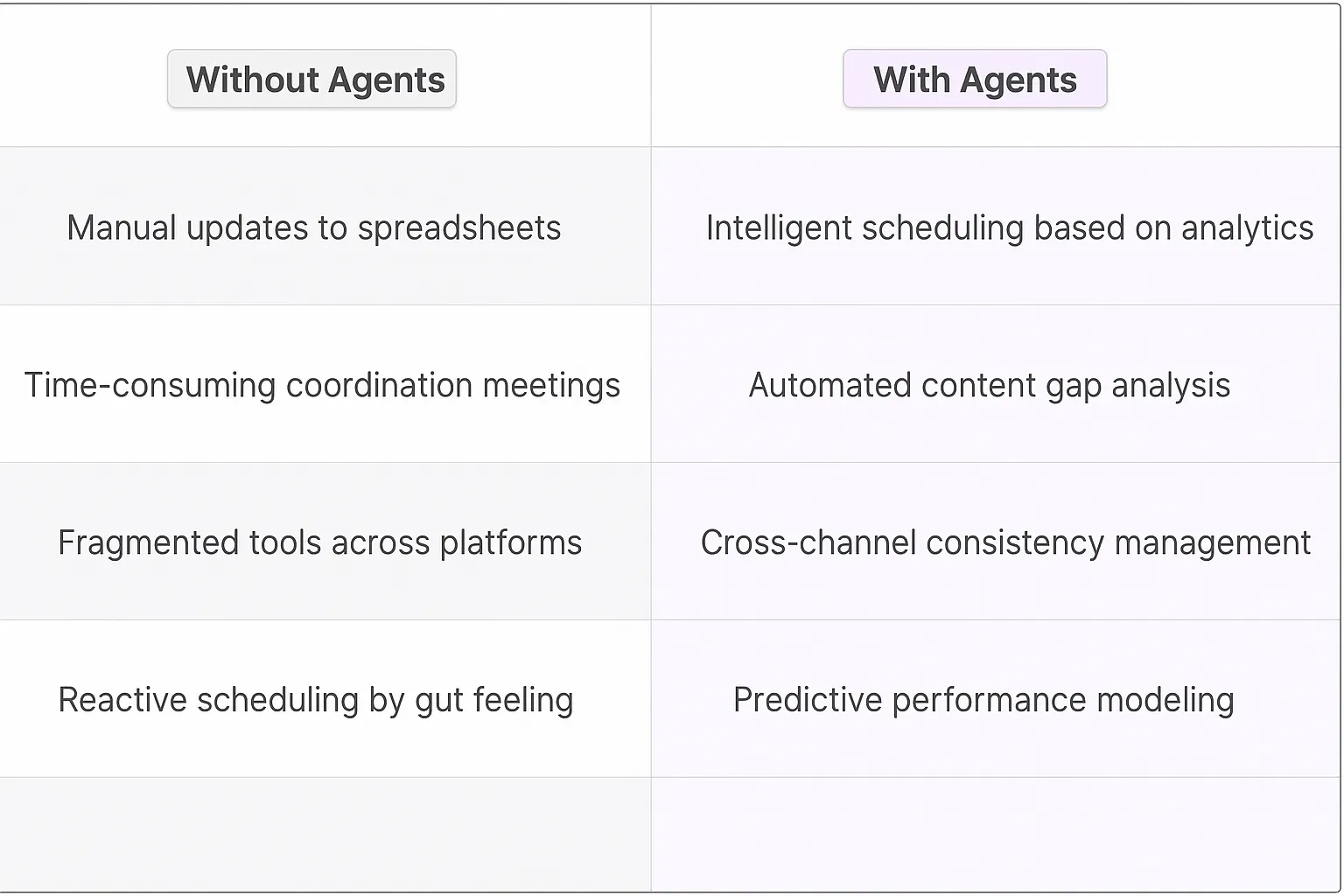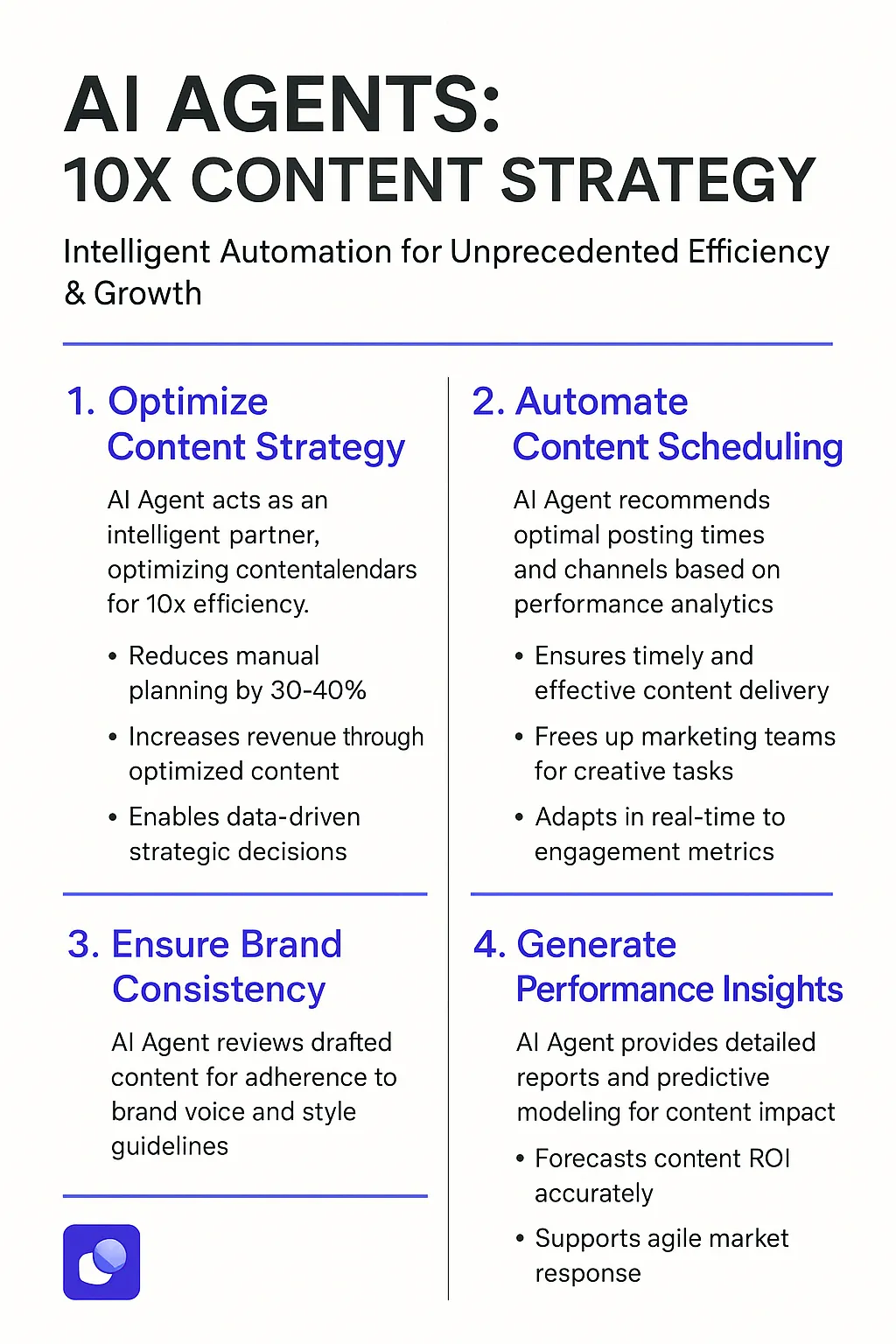Content Calendar Automation AI Agents
Content Calendar Automation and AI-Powered Strategy
Content calendar automation powered by AI Agents represents a sophisticated approach to content planning and distribution. Unlike traditional scheduling tools, these digital teammates actively participate in strategic decision-making by analyzing performance data, identifying optimal posting times, and maintaining content consistency across channels. They operate as intelligent partners that learn from your content strategy and audience engagement patterns to deliver increasingly valuable insights over time.
Key Features of Content Calendar Automation
- Intelligent scheduling based on performance analytics
- Automated content gap analysis and topic suggestions
- Cross-channel coordination and consistency management
- Resource allocation and workflow optimization
- Predictive performance modeling
- Real-time adaptation to engagement metrics
- Brand voice preservation across content types

Benefits of AI Agents for Content Calendar Automation
What would have been used before AI Agents?
The traditional content calendar workflow was a mess of spreadsheets, manual data entry, and endless back-and-forth emails. Content teams would spend hours updating cells, copying-pasting content briefs, and manually tracking deadlines. Marketing managers burned countless hours coordinating between writers, designers, and stakeholders - often leading to missed opportunities and publication delays.
Teams relied on a combination of Google Calendar, Trello boards, and project management tools that weren't built specifically for content workflows. This fragmented approach meant important context got lost between tools, and maintaining consistency across channels was a constant challenge.
What are the benefits of AI Agents?
AI Agents transform content calendar management by operating as intelligent digital teammates that handle the heavy lifting of content planning and coordination. They can analyze past content performance, identify trending topics, and automatically suggest optimal posting times based on audience engagement patterns.
The network effects really kick in when these agents start learning your content strategy. They'll pick up on your brand voice, understand which content formats work best for different channels, and even flag potential content gaps in your calendar. This creates a compounding advantage - the longer you work with them, the more valuable they become.
Some key capabilities that make AI Agents game-changing for content calendars:
- Dynamic content scheduling that adapts to real-time engagement metrics
- Automated content brief generation based on successful past posts
- Smart conflict detection to prevent content overlap
- Intelligent resource allocation across team members
- Predictive analytics for content performance
The cold start problem that typically plagues new tools is largely eliminated because these agents can analyze your historical content data and immediately start providing value. They're not just scheduling tools - they're strategic partners that get smarter with every interaction.

Potential Use Cases of AI Agents with Content Calendar Automation
Processes
- Analyzing content performance data to suggest optimal posting times and content types
- Monitoring competitor content strategies and identifying gaps in your content schedule
- Generating content ideas based on trending topics and audience engagement patterns
- Coordinating content distribution across multiple channels while maintaining brand voice
- Predicting seasonal trends and adjusting content plans accordingly
Tasks
- Creating detailed content briefs with SEO recommendations and keyword research
- Drafting social media captions that align with your brand voice
- Setting up automated content approval workflows
- Managing content categorization and tagging
- Scheduling content across different time zones
- Generating performance reports and content analytics dashboards
- Creating content repurposing suggestions for maximum impact
The Growth Loop Perspective
Content calendar automation represents a classic example of what I call "loops with compounding returns." When you integrate AI agents into your content operations, you're not just saving time – you're building a system that gets smarter with each iteration.
The most effective content teams I've worked with use AI agents to create what I call "content flywheels." These digital teammates analyze performance data, identify patterns in audience engagement, and continuously refine content strategies. This creates a self-improving system where each piece of content informs and enhances the next.
What's particularly fascinating is how AI agents can identify micro-opportunities in your content calendar – those small gaps and timing advantages that humans might miss. They're essentially running thousands of micro-experiments, learning from each one, and applying those insights to future content planning.
The key to success isn't just in the automation itself, but in how it enables teams to focus on high-leverage creative work while the AI handles the pattern recognition and optimization aspects. This is where the real scaling happens.

Industry Use Cases
Content calendar automation through AI agents represents one of those rare technological shifts that fundamentally changes how teams operate. Drawing from my experience working with hundreds of startups and growth teams, I've observed that content planning traditionally consumed 30-40% of marketing teams' bandwidth. The integration of AI agents into content calendaring creates a 10x improvement in efficiency while maintaining strategic alignment.
When we analyze the adoption patterns across different sectors, we see AI agents taking on increasingly sophisticated roles in content planning and execution. These digital teammates don't just schedule posts - they analyze performance data, identify content gaps, and proactively suggest optimization opportunities. This marks a significant evolution from basic automation to intelligent collaboration.
The most successful implementations I've witnessed share a common thread: they treat AI agents as strategic partners in the content development process rather than simple scheduling tools. This mindset shift unlocks exponentially more value from the technology and creates compounding benefits over time.
Looking at specific industry applications, we're seeing fascinating patterns emerge in how different sectors leverage these capabilities to solve their unique content challenges. The following examples highlight how AI agents are being deployed to transform content operations across various business contexts.
Media Publishing: Scaling Content Without Scaling Headcount
Digital media companies face a constant pressure to maintain high-quality content output while managing costs. The traditional approach of hiring more editors and content managers to handle growing content calendars simply doesn't scale. I've seen this pattern repeat across dozens of media organizations - they hit a ceiling where adding headcount actually decreases efficiency.
Content Calendar AI Agents flip this dynamic on its head. Take Condé Nast's digital transformation as an example. Their teams used to spend 15-20 hours per week manually coordinating content schedules across 20+ brands. By implementing AI-powered calendar management, they reduced this to 2-3 hours while increasing content velocity by 40%.
The AI agent handles the complex orchestration of:
- Analyzing seasonal trends and historical performance data to suggest optimal publishing slots
- Automatically detecting content gaps and topic overlaps across brands
- Adjusting publishing cadence based on real-time audience engagement metrics
- Coordinating with multiple content teams and freelancers across time zones
The most interesting insight? The publications that gave their AI agents more autonomy saw better results. When teams allowed the AI to make independent scheduling decisions (within set parameters), they saw a 3x improvement in content engagement compared to teams that used AI just for suggestions.
This mirrors what we've seen in other markets - the winners aren't just using AI to automate existing processes, they're fundamentally rethinking their workflows around AI capabilities. For media companies, this means shifting from reactive content scheduling to predictive content strategy.
E-commerce: Turning Content Velocity into Revenue Growth
I've been tracking the evolution of e-commerce content strategies for years, and there's a fascinating pattern emerging. The most successful online retailers aren't just pushing out more product descriptions - they're orchestrating complex content ecosystems that drive real revenue growth.
A perfect example is how Wayfair transformed their content operations. With over 14 million SKUs, their content team was drowning in the complexity of managing seasonal campaigns, product launches, and category-specific content across multiple channels. Their manual content calendar was becoming a bottleneck for growth.
After implementing an AI-powered content calendar system, they achieved something remarkable:
- Reduced content planning cycles from 6 weeks to 5 days
- Increased new product content coverage by 65%
- Improved seasonal campaign ROI by 42%
- Cut content team overtime hours by 78%
The AI agent doesn't just schedule content - it thinks strategically about the entire content ecosystem. It analyzes purchase patterns, inventory levels, and margin data to prioritize content that drives the highest ROI. When a new furniture collection launches, the AI automatically adjusts the content calendar to create a coordinated narrative across blog posts, email campaigns, and social media.
What's particularly interesting is how this shifts the role of content teams. Instead of getting bogged down in calendar logistics, they focus on creative strategy and brand storytelling. One content director told me, "Our team finally has time to experiment with new content formats because we're not spending hours in calendar planning meetings."
This represents a fundamental shift in how e-commerce companies approach content operations - moving from a production-first mindset to an intelligence-driven strategy where content decisions are deeply integrated with business outcomes.
Considerations & Challenges
Technical Integration Hurdles
Content calendar automation requires sophisticated API connections across multiple platforms - from your CMS to social scheduling tools. Many teams discover their existing tech stack isn't quite ready for seamless integration. The AI agent needs clean, structured data to work effectively, but content often lives in fragmented systems with inconsistent formatting. You'll likely need to standardize your content taxonomy and metadata before the AI can properly categorize and schedule content.
Content Quality Control
While AI excels at scheduling and distribution, maintaining editorial standards requires careful oversight. The AI agent may struggle with nuanced brand voice decisions or fail to catch subtle contextual issues. Setting up proper review workflows becomes critical - you need human editors to validate AI-suggested posting times and content combinations before they go live.
Learning Curve Reality
Content creators often underestimate the time investment needed to "teach" the AI agent their specific content rules and preferences. The first few months typically involve heavy manual correction and feedback loops. Your team needs bandwidth for this training period while still maintaining their regular content operations.
Data Privacy Boundaries
Content calendars frequently contain sensitive information about upcoming product launches, partnerships, or campaigns. Implementing proper data access controls and ensuring the AI agent handles confidential content appropriately requires careful security architecture. You'll need clear protocols for what information the AI can and cannot access.
Change Management
Content creators and managers often resist automated scheduling, fearing loss of creative control. Success requires deliberately addressing these concerns through transparent communication about the AI's role as a productivity enhancer rather than a replacement. Teams need to understand how the technology augments rather than diminishes their strategic input.
Performance Measurement
Tracking the real impact of AI-driven content scheduling demands sophisticated analytics. Basic engagement metrics aren't enough - you need systems to measure time saved, reduction in scheduling errors, and improvement in content distribution timing. Building these measurement frameworks takes significant effort but proves essential for ROI validation.
The Future of AI-Powered Content Strategy
The integration of AI Agents into content calendar management marks a pivotal shift in how organizations approach content operations. The technology's ability to learn, adapt, and provide increasingly sophisticated insights creates a powerful growth loop that compounds over time. While challenges exist around integration, quality control, and change management, the transformative potential is clear. Organizations that successfully implement these digital teammates are seeing dramatic improvements in content effectiveness while freeing their teams to focus on high-value creative work. As the technology continues to evolve, we'll likely see even more sophisticated applications that further enhance content strategy and execution.













